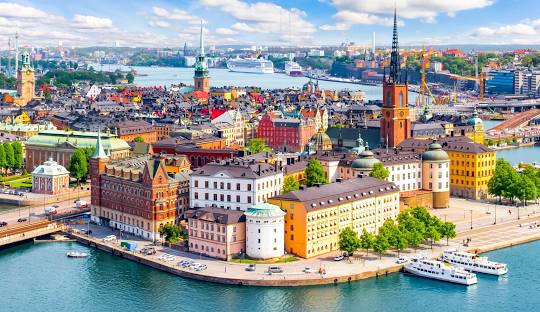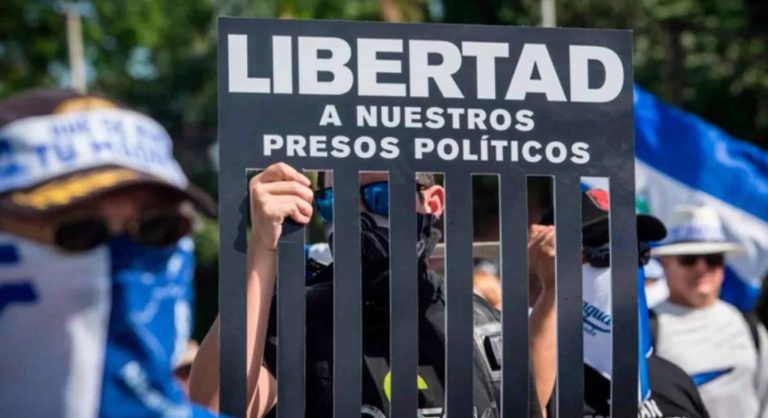16 de agosto 2023

Former Ambassadors: Sweden Must "Do More" Against Dictatorship in Nicaragua

PUBLICIDAD 1M
PUBLICIDAD 4D
PUBLICIDAD 5D
Relatives wander from prison to prison searching for them, spending over a week with no knowledge of their whereabouts. Some still have no information

Protest for the freedom of political prisoners in Nicaragua // Photo: Archive.
The dictatorship of Daniel Ortega and Rosario Murillo condemns Nicaragua's new political prisoners to "forced disappearance". It hides their whereabouts from their anguished relatives who make a pilgrimage from prison to prison asking for them. After the illegal arrest of a citizen or opponent – with no arrest warrant or accusations against them – the relatives go through departmental or district police stations in Managua until they reach the Judicial Assistance Directorate (DAJ), known as El Chipote. But the police do not confirm their location until several days after the capture, or not at all.
On August 2, 2023, the police arrested 65-year-old former political prisoner Juan Carlos Baquedano in Jinotega. Without a warrant, the officers transferred him to Managua, more than 140 kilometers away.
Hours after the kidnapping, the family asked the departmental delegation if they could drop off food, but they were told that Baquedano was not there. They continued their search until days later they confirmed that he was in Police District III, in Managua.
Carmen, the mother of a political prisoner, endured the kidnapping of her daughter and not knowing her whereabouts. The prisoner of conscience is one of more than thirty people captured in April 2023, in the context of the fifth anniversary of the Civic Rebellion of 2018.
When Carmen arrived at the police delegation of her department, in the southeast of the country, she was told that they knew nothing about her daughter. Heartbroken, she had no idea what to do, but a contact told her that she had surely been taken to Police District III, in the capital. That precinct has become the new prison where the dictatorship locks up prisoners of conscience, after the banishment of 222 political prisoners.
"I arrived at District III and they told me that she was not there, they sent me to El Chipote, and from El Chipote they sent me again to District III, that she was there," he says. An officer on duty accepted her food and only told her that her daughter was under investigation.
CONFIDENCIAL spoke with relatives of political prisoners and human rights defenders who confirmed that there is a pattern in the arrests of new prisoners of conscience. It takes four, five days, or even a week from delegation to delegation before the police confirm that they are in District III. Some are not officially confirmed either, but family members presume they are there because the officers accept the entry of food and toiletries. In that prison, none of them were allowed to visit.
Exiled activist and former political activist, Ivania Álvarez, details that this “forced disappearance” has been recurrent since the social outbreak of 2018. However, she argues that now there is greater secrecy in the treatment of cases of political prisoners.
"These people – the political prisoners captured in April – are being held without contact for more than 40, 50 days because visits were not allowed in the Police Districts,” details Alvarez.
A month passes before the political prisoners are transferred to the penitentiary systems and authorized a first supervised meeting with their families. Carmen, for example, was able to see her daughter 69 days after her arrest.
Police violate the law by not informing family members
Article 232 of the Code of Criminal Procedure (CPP) establishes that the police have the duty to “inform the person at the moment of arrest, of the causes of his detention in detail and in a language or manner that he understands.”
In addition, they have “the right to be advised by a defense counsel of his choice, so that he may designate one” and to inform relatives or other persons related to the detainee who request it. This includes information on the police unit where the detainee was taken, and “to allow the detainee to inform his family or whoever he deems appropriate.” But none of these guarantees are fulfilled for political prisoners.
Lawyer Yonarqui Martínez confirmed to CONFIDENCIAL that the police have a legal obligation to provide information regarding any person in their custody. Otherwise, she defines, “they are hiding them.”
Martínez defended dozens of political prisoners since the repression against the April 2018 Rebellion, until she was disbarred by the Supreme Court of Justice (CSJ), under the control of the dictatorship. The lawyer recalled that from that year to date, the Police transferred prisoners of conscience from different Districts to El Chipote. “They move them out of malice,” she affirmed.
Relatives can file a motion of habeas corpus
The specialist in Criminal Law recommended that “the best way to exercise the right, in this case, is to file a motion of habeas corpus.” She recognized that these motions are not complied with in practice because the judicial processes against political prisoners are so irregular. However, she considers that the basis of the repeated violations of the law serves to document these outrages against prisoners of conscience.
Activist Ivania Álvarez added that the Ortega regime has increased the secrecy surrounding prisoners of conscience, hiding information about their judicial processes. By law, these should be published in the Judicial Power's Nicarao System, but they do not appear. Family members who are “lucky” enough to receive any information are only told that “they are under investigation.”
Martinez explains that the information siege on political prisoners has always existed, but the current aggravation is that the regime does not allow any private lawyer to defend them. First, it assigns them a lawyer from the Public Defender's Office who also responds to the dictatorship. Second, the CSJ has stripped several lawyers in retaliation for defending prisoners of conscience.
With this secrecy, it is increasingly difficult to know the status of political prisoners held by the dictatorship. Also, family members who denounce abuses are threatened with mistreatment against their imprisoned relatives.
Martinez added that even in those cases for which they do publish information in the Nicarao system, they no longer add complete information. “They are manipulating the system in such a way that if before you could see 70% of the information on a case, now you only see 20% or 25%, because the case does appear, but the proceedings do not appear. This is happening now in greater proportion,” she denounces.
The secrecy surrounding the cases of prisoners of conscience also includes priests imprisoned by the dictatorship. Father Fernando Zamora Silva, chancellor of the Diocese of Siuna (in the Northern Caribbean) was arrested on July 9, and his whereabouts and physical situation remain unconfirmed. It is also not known what has happened to Father Jaime Iván Montecinos Sauceda, 61 years old, pastor of the Juan Pablo II church in the municipality of Sébaco, in Matagalpa, arrested on May 23.
The Police only reported that Father Montecinos Sauceda was under investigation for allegedly “committing acts that undermine the independence, sovereignty, and self-determination of the nation, in accordance with Article 1 of Law 1055 or Law for the Defense of the Rights of the People to Independence, Sovereignty and Self-Determination for Peace.” In the case of Father Zamora, nothing has been reported.
More than half a dozen priests remain imprisoned in Nicaragua, some convicted of common crimes and others accused of fabricated political crimes. Among them, the bishop of Matagalpa, Rolando Alvarez, who remains in a maximum security cell in La Modelo prison, was sentenced to more than 26 years in prison.
The bishop is also subject to a “forced disappearance” since justice in the service of the dictatorship does not allow him to receive visits from his relatives. The last and only time he has been seen since his imprisonment in August 2022 was in March 2023, almost a month and a half after his transfer to a maximum security cell.
This article was originally published in Spanish in Confidencial and translated by our staff.
PUBLICIDAD 3M
Confidencial es un diario digital nicaragüense, de formato multimedia, fundado por Carlos F. Chamorro en junio de 1996. Inició como un semanario impreso y hoy es un medio de referencia regional con información, análisis, entrevistas, perfiles, reportajes e investigaciones sobre Nicaragua, informando desde el exilio por la persecución política de la dictadura de Daniel Ortega y Rosario Murillo.
PUBLICIDAD 3D